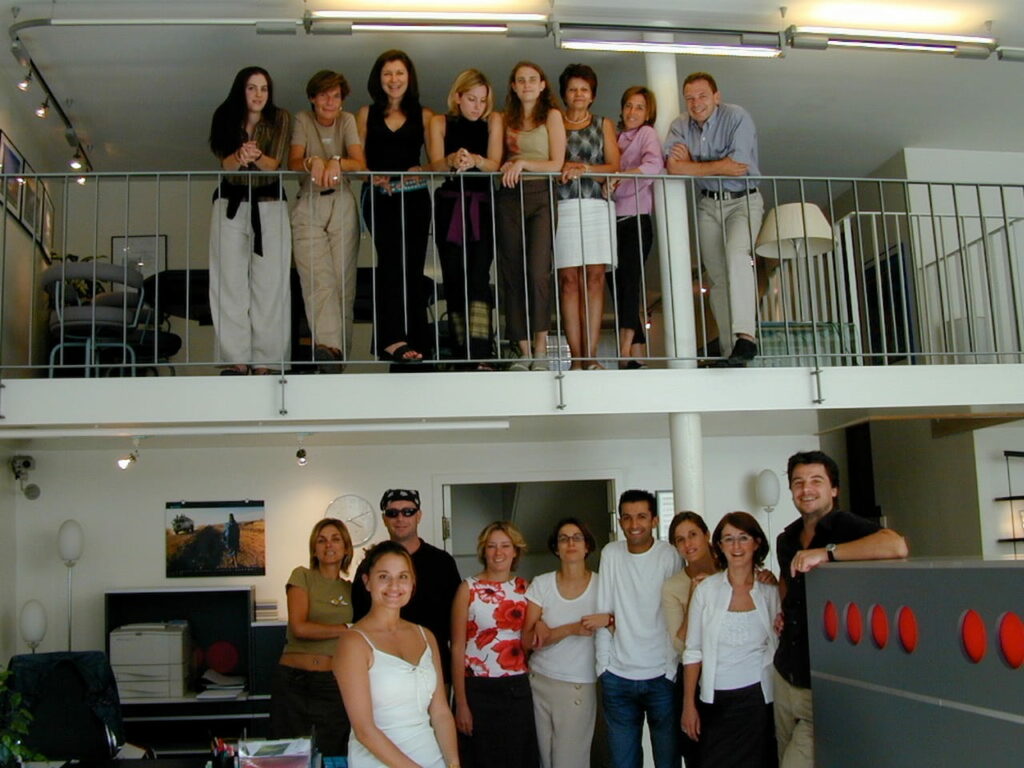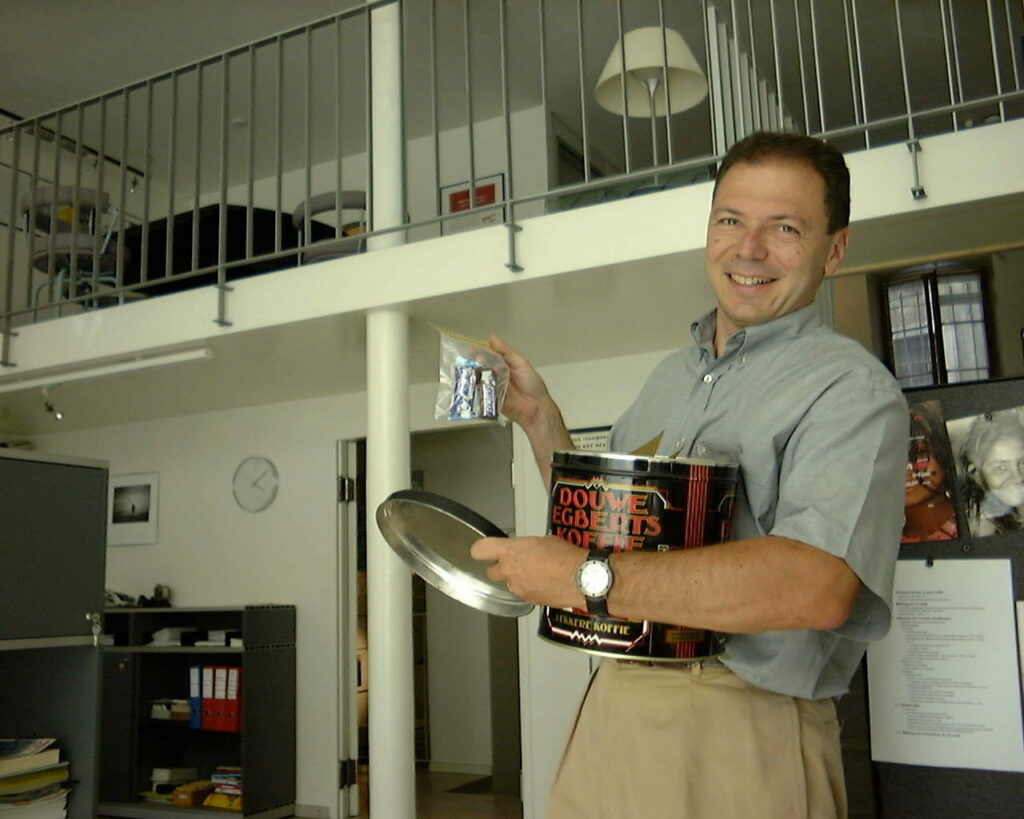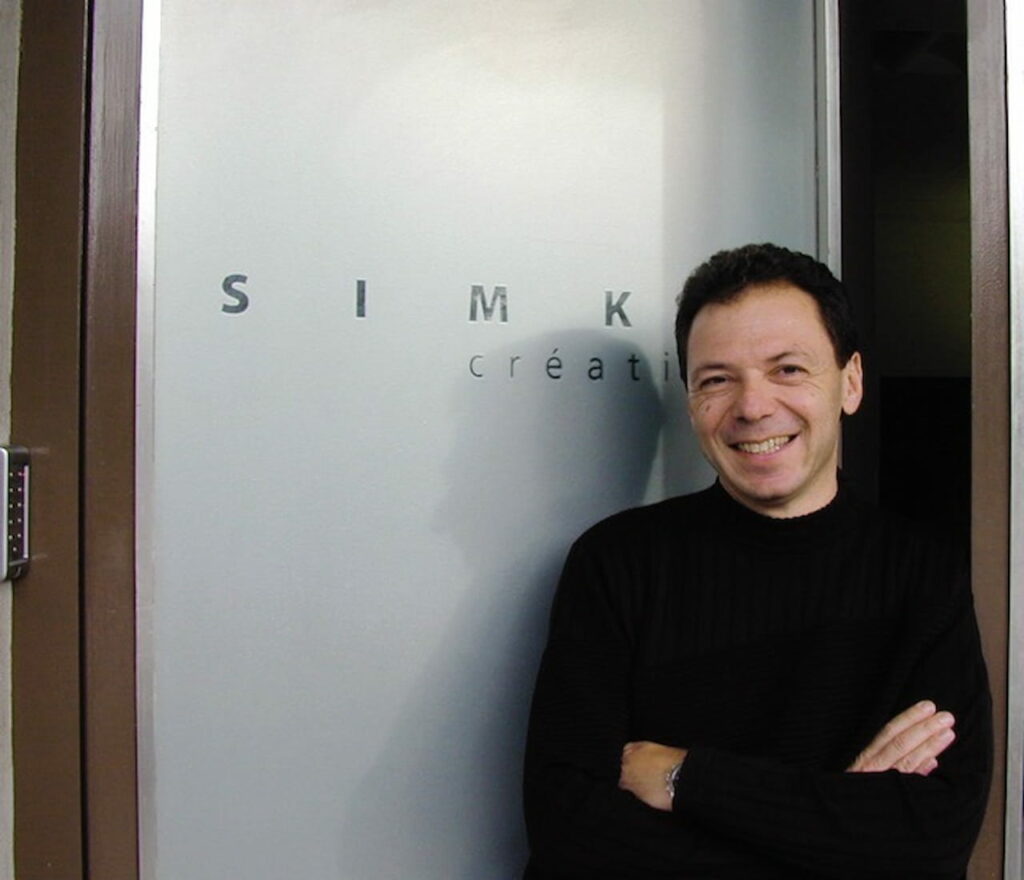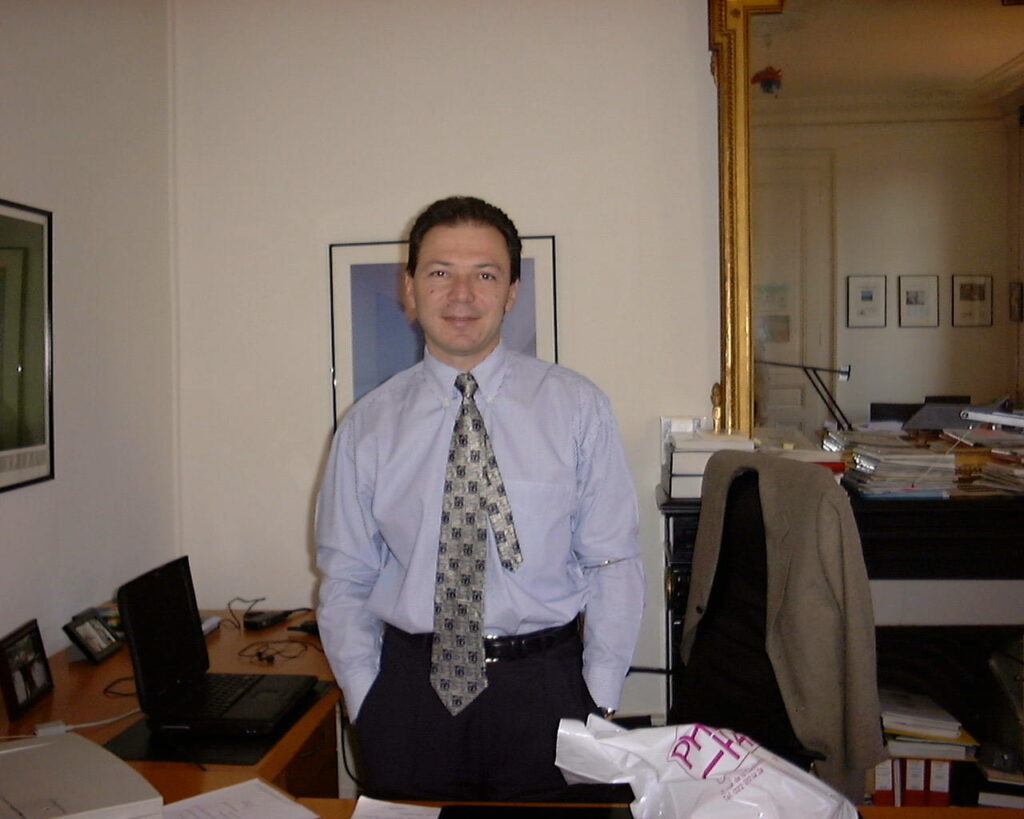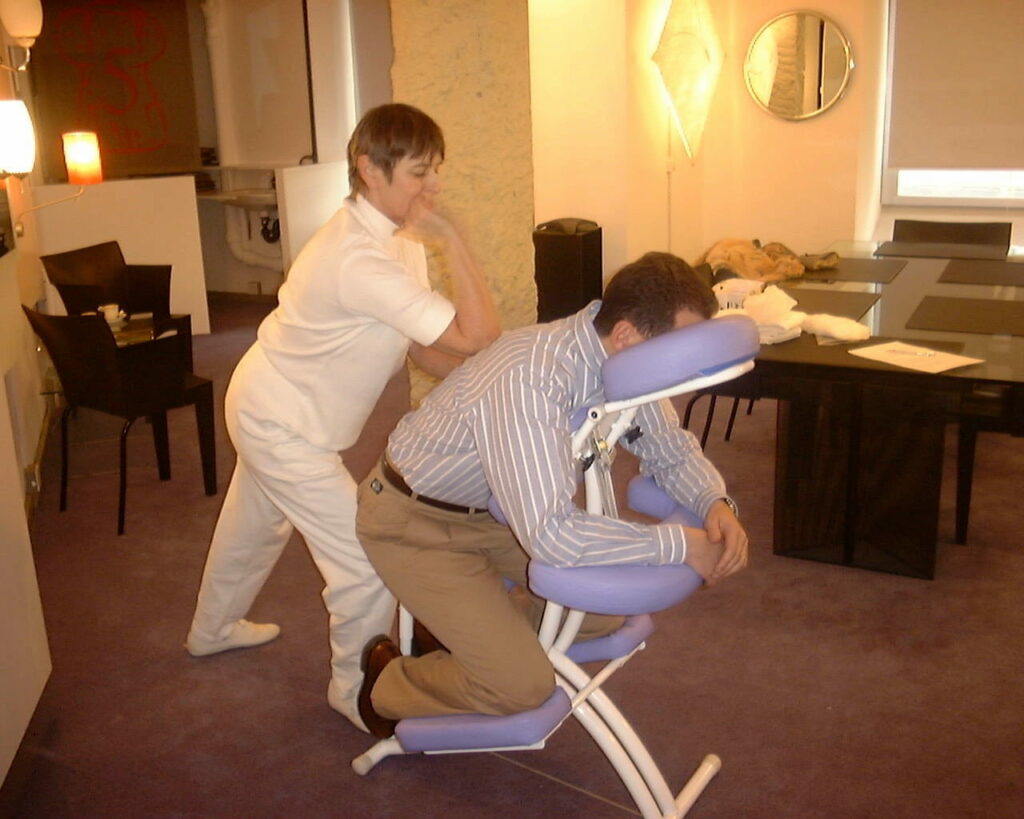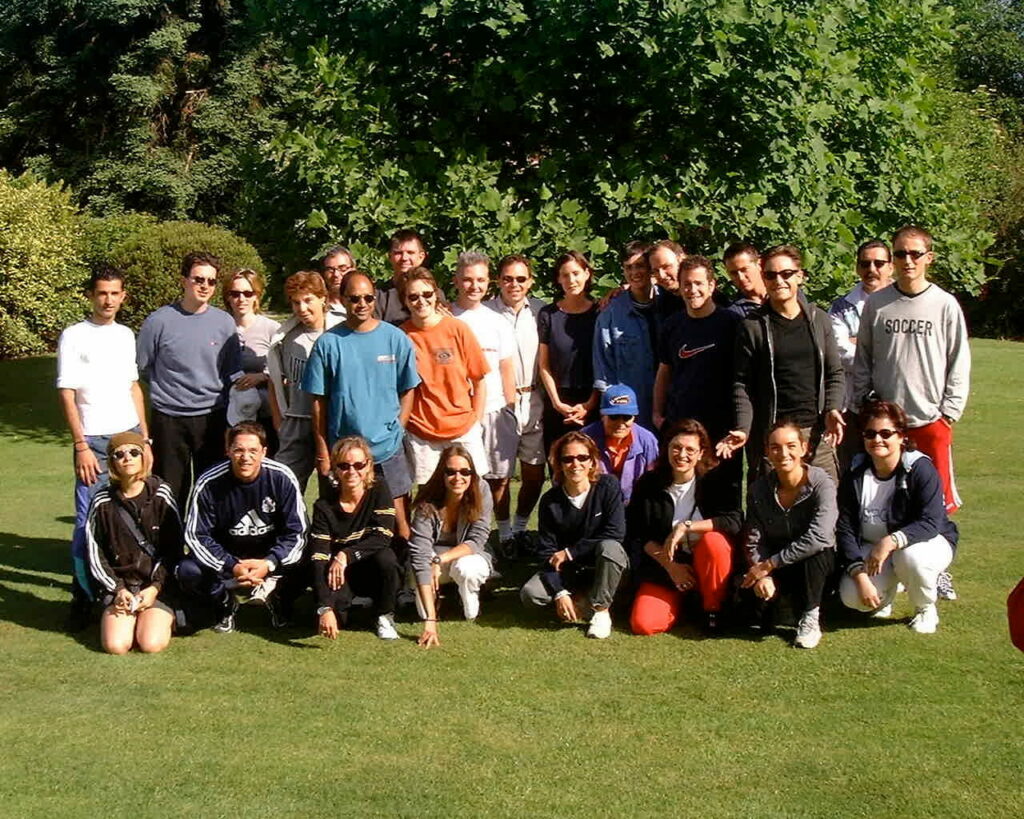In 2001, for Simko’s tenth anniversary, we were 12 full-time employees, plus a large number of external freelancers. We had about 15 regular clients, in both the French and the German part of Switzerland. We were often talked about in the press, and every year we had been growing by about 20%. We were making good money. And we had just recently moved into new and hip offices in Geneva.
We did everything we could to make employees feel good in the office, including the occasional session of massages and an annual party weekend, to which employees and their spouses were invited.
Everything seemed good from the outside, but I was unhappy. We were successful financially, and I was clever at generating new business, but the advertising we produced was far from remarkable. I was beginning to think of the future and realised that only an advertising agency that was high up on the national creative rankings had any value in the market. But Simko was not even mentioned in the Swiss creative classifications. In fact, we didn’t even submit work at the time, it was not worth it. Bad creative rankings (or none at all) were also hampering us from hiring great personnel.
So, I reached out to Olivier Girard, at the time the best-known creative director in the French-speaking part of Switzerland. Olivier had a stellar reputation and had spent his formative years in Paris, where he had worked with Rémy Babinet, one France’s best-known and most awarded creatives.
During our initial phone conversation, Olivier told me that he was not interested in joining our agency. He didn’t want to be associated with what he considered to be an agency with no creative pedigree.
After a number of trials, I was finally able to convince Olivier to have lunch with me. I asked him what was important in his life, other than producing great creative work. ‘I’d like to do a few short films,’ he said. ‘How much time would this take?’ I asked him. ‘On average, I will need to work four days a week for at least a year to make the kind of short films I’d like to, but I can’t do it right now, no agency will hire me if I work only three days a week.’ ‘I will,’ I said. He looked up. Before he could say another word, I put a white piece of paper in front of him and said: ‘Just write down the salary you’d like to have for three days of work per week. You can choose the days you work. I don’t mind if you work Saturday, Sunday and Tuesday one week, and the next Wednesday, Thursday and Friday. In fact, I won’t even check. What I care about is that the work gets done. And to have you on board.’
He was startled, but didn’t say no. Three days later he walked into my office, gave me back my piece of paper, on which he had written a very reasonable salary. But he had also added two other conditions: 1) Pedro can have the last word on strategy and business decisions, but Olivier will have the last word on creative work; 2) Simko will get rid of clients who have no creative potential for the agency.
I agreed on the spot. Two days later, Olivier and I met at my home (we thought that meeting at the agency would have been too risky) and went, one by one, through the list of Simko’s clients. When we had finished our assessment, four clients, representing 25% of the agency’s turnover, were in the red zone, indicating that they did not have the necessary potential to produce great creative work.
Olivier looked at me straight in the eye and I agreed to do what I had promised: I met with the four clients and told them that we would part ways. I explained that a new creative director was coming on board and that the type of work that they were requesting of us did not correspond to what we wanted to do in the future. ‘What do you want to do?’ the clients asked. ‘We want to become one of Switzerland’s most creative agencies,’ I said. They were all startled. Three out of the four said that they regretted the decision, but if that was my choice, then fine. I found other agencies to replace Simko, and managed the process in a way that created no problems for the clients.
The fourth client was a large shopping centre. We had been working for them for several years, and had always received excellent year-end ratings. I had a great relationship with the CEO. Over lunch I explained to him what I was up to and why I no longer wanted to work for them. ‘Are you feeling OK?’ he asked me. ‘Yes, I feel great,’ I said. ‘Don’t you want to go on holidays and think this through?’ the CEO asked. ‘I mean, we love you here, you know. Every one of us on the comité think that you personally and your agency are fantastic, I just don’t understand what you’re up to.’ I explained again, but it was no use. I promised to ‘think it over’ and we had lunch again a few weeks later.
At our second lunch I again said that we wanted to part ways. ‘Is it money?’ the CEO wanted to know. ‘Because, you know, we can talk about your fees, I’ve spoken to the members of our comité, and we’re happy to increase them.’ ‘No,’ I said, ‘it’s not money, it’s the level of creative work that you ask us to do. Every time we present work to you, you choose the worst creative concept and then, after several rounds of rework, your team make it even worse.’ ‘But we love the result,’ the CEO said. ‘That’s the problem,’ I said.
The CEO wouldn’t let go, he kept trying to convince me to stay on. I finally said to him, during our third lunch on the same subject: ‘Every Monday morning we get together as a team to distribute the creative work that needs to be done for the week; those who arrive late, work on your business.’ Startled, the man looked up and finally let go. As with the other clients we had resigned, we helped the shopping centre identify and onboard a new, ‘less complicated’ agency.
The CEO and I stayed on good terms, and he was cordial whenever I bumped into him. To his credit, a few years later, after we had become famous for our creative work, he sent me a very nice note saying that he now understood what I had done and congratulated me on the agency’s achievements.
During 2002, the year after Olivier joined us, we participated in eight pitches for big national clients who required highly creative work. We won seven of them. No other agency, before or after our time, has ever had such a winning streak in Switzerland. Our business grew by 50%, despite the loss of the four clients we had resigned.
The following year, we won the Campaign of the Year Award, Switzerland’s most coveted creative prize. Simko is still the only agency ever from the French-speaking part of Switzerland to have won this prize.
The only pitch we lost in 2002 was for Audemars Piguet. This high-end and very prestigious watch brand invited us to make our final presentation, in front of their CEO (who I had never met), in their offices in Le Brassus on June 12 at 10am. It happened to be the day when Argentina was playing a key match against Sweden during the 2002 World Cup, which that year was held in Korea.
Since 1986, I had made a promise to myself that whenever Argentina played in the World Cup, I would wear the Argentina t-shirt all day, no matter where I was or what I had to do. So, on the morning of June 12, I left home at 7am, wearing a dark suit and, instead of a white shirt and a tie, the bright blue and white Argentina t-shirt. I arrived in Le Brassus, a tiny town about an hour and a half away from Geneva, just before the match started. In the only café that was open, I convinced the manager to switch on the TV. I sat there from 9 to 9.45am watching the game, then wandered over to Audemars Piguet, where I met my team.
Awaiting us in the magnificent presentation room were about ten people from Audemars Piguet, all impeccably dressed in dark business suits. We sat down and I noticed that the CEO was, not surprisingly, eyeing me. I started the presentation telling my story about Argentina and the promise that I had made to my country many years before. ‘Please take no offence in me wearing a t-shirt to our meeting today, I hope you don’t see it as a sign of disrespect,’ I said. ‘When is this Argentina match being played?’ the CEO wanted to know. ‘The first half just finished,’ I said, ‘they’ll start the second half in a few minutes.’
After hearing this, the CEO got up and went to a phone that was at the other end of the room. ‘Mrs. Müller,’ he said, ‘when is the next agency coming to present? Aha,’ he said, ‘could you please call them and ask them if they could come in an hour later?’ He then pressed a button, a screen came down and he said: ‘Let’s watch the second half of this Argentina match.’
The first half had ended 1 to 0 for Sweden. In the second half, Argentina managed to score at the very end, but it wasn’t enough. A draw meant that Argentina was disqualified, their hopes for a third World Cup title dashed. When the match ended, large images appeared on the screen of the Argentina team, with players like Batistuta, crying.
I was in total shock. Not a word was spoken in the room for about a minute. Then the CEO got up and again walked to the phone. ‘Mrs. Müller? Did you reach the next agency and tell them to come an hour later? Good. Could you call them again and ask if they could delay for another hour? Tell them I’m sorry, but we have an emergency to deal with.’ Then he walked over to me, put his hand on my shoulder and said: ‘Simko, you are in no shape to make a presentation right now. Go for a walk, call your family in Argentina and clear your head. We look forward to seeing you in an hour!’
Our presentation was good, but not good enough and we didn’t win. But I never forgot the CEO’s humanity. We stayed in touch for many years thereafter. For every World Cup match that Argentina played, in what became a ritual, the CEO would call me to wish me good luck, even after he had retired from Audemars Piguet.
The River
Pedro Simko

The River
Pedro Simko

